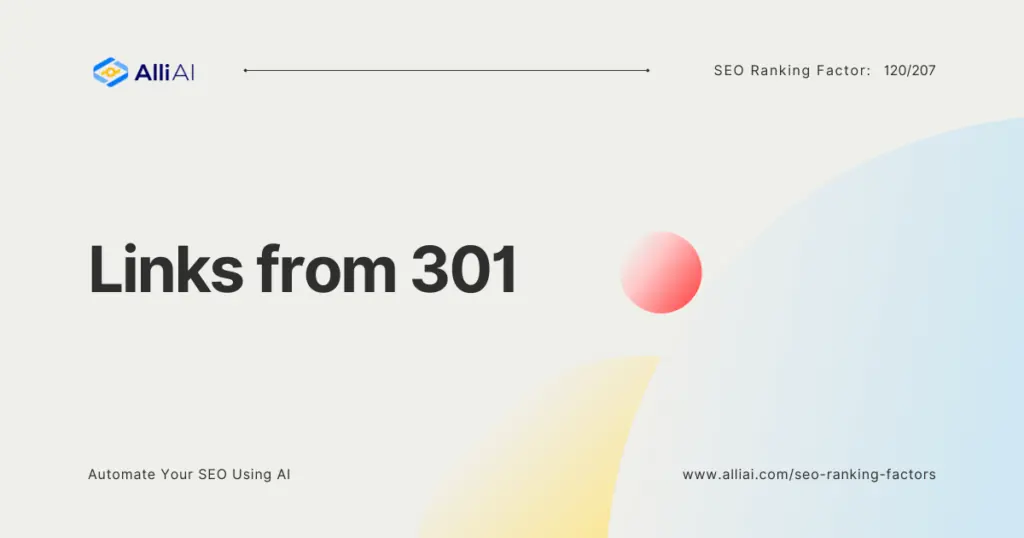What is Links from 301 Redirect?
A 301 redirect is a permanent redirect from one URL to another. When a web page moves to a different location, a 301 redirect ensures that users and search engines are directed to the correct page. It’s like forwarding your mail when you move to a new house; the post office knows to send your mail to your new address. In the digital realm, this ensures that any link juice (the value passed through links) is also transferred to the new URL.
Understanding the Mechanics: How 301 Redirects Work
At its core, a 301 redirect is an HTTP status code that signals a permanent move from one URL to another. When a user or search engine bot requests the old URL, the server responds with this code, along with the new URL in the “Location” header. The browser or bot then automatically fetches the content from the new URL, ensuring a smooth transition.
There are various methods to implement 301 redirects, each with its own advantages and ideal use cases:
- .htaccess: This server-level configuration file is commonly used in Apache servers. It’s powerful and flexible, but requires some technical knowledge to implement correctly.
- Server-Level Redirects: Many web hosting providers offer tools or interfaces to easily set up 301 redirects without directly editing configuration files. This is a user-friendly option for those less comfortable with server-level configurations.
- Plugins (for CMS platforms): Content Management Systems like WordPress offer plugins that simplify the creation and management of 301 redirects, making it accessible to users with minimal technical expertise.
Choosing the right method depends on your technical skills, server environment, and the complexity of your redirects.
Why is Links from 301 Important in SEO?
The impact of 301 redirects on SEO is multifaceted, affecting both the preservation of link equity and search engine rankings.
1. Link Equity Transfer
According to various studies and industry analyses, 301 redirects pass the majority of link equity (the ranking power of a backlink) to the redirected page. Google itself has indicated that 301, 302, and other 3xx redirects do not lose PageRank any more than a direct link does. This underscores the importance of using 301 redirects to maintain the SEO strength of a website when URLs are changed or updated.
2. Impact on Search Rankings
Using 301 redirects effectively can have a significant impact on a website’s search engine ranking. For example, a Moz case study revealed that after properly implementing 301 redirects for a site consolidation, the site saw a 40% increase in traffic, highlighting the direct influence of redirects on SEO outcomes. Ensuring that redirects are correctly implemented helps maintain continuity in search engine indexing and ranking.
Advanced 301 Redirect Strategies: Navigating Complex Scenarios
Beyond simple URL changes, 301 redirects can be strategically employed in various scenarios:
- Site Migrations: When migrating a website to a new domain or platform, 301 redirects are essential to ensure that all old URLs are redirected to their corresponding new ones, preserving link equity and minimizing traffic loss.
- Content Consolidation: If you’re merging multiple pages or consolidating content, 301 redirects can guide users and search engines to the most relevant and updated version of the content.
- Duplicate Content Issues: Resolving duplicate content problems often involves using 301 redirects to consolidate similar pages into a single canonical URL.
However, implementing 301 redirects requires careful planning and execution. Common mistakes like redirect chains (multiple redirects in a row) and redirect loops (a redirect that leads back to itself) can negatively impact user experience and SEO.
FAQ
How does Google view 301 redirects?
Google views 301 redirects as a permanent move from one URL to another, transferring most of the link equity to the new URL. It’s a recommended practice for websites undergoing restructuring to ensure minimal disruption in search rankings.
Are 301 redirects the best way to handle all redirects?
While 301 redirects are essential for permanent URL changes, they’re not always the go-to solution for every redirect scenario. For temporary changes, a 302 redirect might be more appropriate. It’s crucial to assess the nature of your URL change before deciding.
Can 301 redirects affect site speed?
Yes, excessive or improperly implemented redirects can impact site speed, as each redirect can add to the page load time. It’s important to use redirects judically and ensure they are set up correctly to avoid unnecessary delays.
Conclusion
Links from 301 redirects hold undeniable significance in SEO. They ensure that even as a website evolves, the valuable link equity accumulated over time is not dissipated but is effectively transferred to keep the site’s search engine ranking intact. While seemingly technical, the concept of 301 redirects is rooted in the simple principle of preserving and passing on value, much like ensuring your personal mail reaches you at your new home after you move. Proper implementation and understanding of this SEO factor can be a game-changer for any website looking to maintain or improve its visibility in the vast digital landscape where every link counts.
In an ever-changing online world, the ability to adapt while preserving the core SEO value through mechanisms like 301 redirects is not just beneficial but essential for sustained online success.






